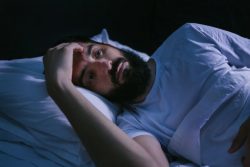How Are Anxiety and Sleep Apnea Connected?
September 20, 2021
Throughout the years, both formal research and observations by medical professionals have found that anxiety and sleep disorders often exist in the same patients. For example, according to one study, anxiety is present in about half of people who suffer from sleep apnea. Is it a coincidence that these two conditions so often coexist, or is there a cause-and-effect relationship between anxiety and sleep apnea in Boca Raton? Let’s discuss this important topic.
A Lack of Sleep Can Contribute to Anxiety
Healthy brain function depends largely on sleep. Without adequate sleep, the body’s balance of mood-controlling chemicals can be disrupted, leading to a heightened risk of emotional difficulties. For example, sleep deprivation can lead to lower levels of serotonin, and a lack of serotonin is often associated with sadness, irritability, and anxiety.
Unfortunately, sleep deprivation is much more common among people who suffer from obstructive sleep apnea (OSA). The pauses in breathing that you experience throughout the night can prevent you from spending an adequate amount of time in the deeper stages of sleep, which are essential for optimal mental and emotional wellness.
Additionally, when you stop breathing during sleep, your body goes into a “panic mode” as it arouses you so you can resume breathing. Naturally, these moments of panic have the potential to increase anxiety.
Anxiety Can Contribute to a Lack of Sleep
The connection between anxiety and sleep disorders is a two-way street. Anxious thoughts may keep you awake at night, causing you to become more and more tired. The more exhausted you are when you finally do fall asleep, the more severe your sleep apnea can be.
What Should You Do?
Anxiety and sleep apnea can create a vicious cycle of sleep deprivation and emotional distress. Fortunately, you may be able to break the cycle. Here are a few suggestions to get you started on your quest for better rest and improved emotional health:
- Get treatment for sleep apnea. An oral sleep appliance can help to keep your airway open at night, eliminating pauses in breathing and allowing you to get the high-quality rest you need.
- Seek assistance with your mental health if necessary. Your primary care practitioner may refer you to an experienced counselor, psychologist, or psychiatrist who can help you cope with anxiety.
- Care for your overall health. Some people with sleep difficulties and mild anxiety find that steps like cutting back on caffeine, exercising more, and practicing meditation help them to sleep better and feel calmer.
Sleep apnea in Boca Raton and uncontrolled anxiety are both serious conditions that can amplify one another. Seeking treatment for them may help you to feel and function your best.
Meet the Sleep Apnea Expert
Dr. Kenneth Mogell is a Diplomate of the American Board of Dental Sleep Medicine. He spends much of his time helping patients conquer sleep apnea via oral appliance therapy. If you are struggling with OSA or even just suspect that you might have a sleep disorder, Dr. Mogell and our team will be happy to speak with you at any of our three convenient locations. You can contact our Boca Raton office by calling 561-353-5252.
